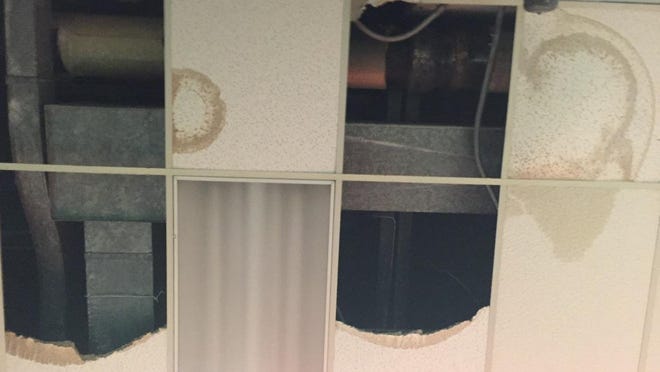Price tag to fix DPSCD buildings: $500M
 Jennifer Chambers
Jennifer Chambers
Detroit — The cost to address widespread, poor building condition across Detroit Public Schools Community District would cost $500 million, according to a report released Friday by the district.
Waiting another five years to deal with the problems would cause that price tag to soar to nearly $1.4 billion, according to OHM Advisors, which spent nearly six months beginning in January performing the facilities assessment and was contracted by the board for $945,000.
Nearly $223 million of high-priority repairs include elevators and lifts, energy supply, heating and cooling systems, sprinklers, standpipes, electrical service and distribution, lighting, wiring, communications, security system, local area networking, public address and intercoms, emergency lights and plumbing fixtures.
Medium-priority items — such as exterior walls, windows and doors, roof coverings and openings and sanitary waste — run $182 million to be addressed. Low-priority issues — such as standard foundations, floor and roof construction, lockers and stair construction — would cost $120.4 million to repair.

About 25 percent of the school buildings are in unsatisfactory condition and another 20 percent are in poor condition, according to the report.
Superintendent Nikolai Vitti was not available Friday for comment on the report.
Board president Iris Taylor said several roofs will be replaced at schools this summer.
"I can tell you we are not going to be spending $500 million between now and the beginning of the school year," she said. "We will have to pick and choose (repairs) and determine which ones (buildings) are at full capacity or not."
According to school board documents, the buildings reviewed have an average age of 66 years old. The review is being done to determine proper investment and usage, the board document says.
"The district now seeks to strategically examine its school-based facilities portfolio in order to realign and strategically leverage taxpayer assets. This requires a comprehensive assessment to provide a roadmap for strategic reinvestment in schools and neighborhoods," the board document says.
The assessment was presented to the board of education in a committee meeting Friday morning. The facilities review was for buildings currently in use, not those empty or shuttered, according to district documents.
Board member LaMar Lemmons, who is on the finance committee, said he thinks the district should sue the state of Michigan to make it pay for buildings that Lemmons said were neglected during seven years of state control.
"They left taxpayers of Detroit in long-term debt," Lemmons said.
In the interim, the district will have to approach the problem one building at a time, he said. The board is expecting to get a full report on the matter before its next board meeting on July 10.
Palmer Park Academy ranked at the top of an index ranking for worst facility conditions. In March, the district closed the school for the remainder of the 2017-18 school year after mold was found there.
Before Palmer Park reopens, it will need, at a minimum, a new roof, "repair and restoration" of the second floor, walls repainted throughout the school, and for water-stained ceiling tiles to be replaced, school officials said at the time.

Seven elementary and elementary/middle schools were cited as being in unsatisfactory condition. They are: Chrysler, Bagley, Carleton, Pasteur, Drew Transition Center, Cooke and Mann.
Fifteen middle schools on the list, including: Palmer Park Academy, Cartsens, Pulaski, Noble, Burns, Greenfield Union and Mark Twain.
High schools listed as unsatisfactory were Pershing and the Detroit International Academy for Young Women.
Parent Zeairra Jordan said on Friday that she is pulling her first-grade son out of DPSCD and enrolling him in a charter school outside Detroit because of poor building conditions at his school, Ann Arbor Trail Magnet Middle School, which is not discussed in the DPSCD buildings report but was assessed, according to district officials.

Jordan said she has gone to school officials multiple time to complain about holes in ceilings, falling ceiling tiles, mold, lead and other dirty conditions.
"There have been times that my child has not gone to school because of these conditions," said Jordan, estimating her son missed up to 50 days of school this year.
Jordan said the district needs to fix its buildings.
“They need to do it. Period. Take care of the school. Our kids are our future,” Jordan said.
Detroit's public school district received $617 million in bailout funds from the Michigan Legislature in the fall of 2016, which allowed up to $150 million for “transitional” costs to form a new district, called DPSCD, but capped “deferred maintenance” at $25 million.
In April 2016, Steven Rhodes, DPS' transition manager, wrote the state treasurer a letter to say the district needed $75 million to address facility needs related to deferred maintenance, space consolidation and school building closure related costs.
Deplorable building conditions in their Detroit schools is one of several allegations in a federal civil rights lawsuits filed on behalf of seven Detroit schoolchildren against the state of Michigan.
Filed in September 2016 against Gov. Rick Snyder and state education officials, the lawsuit claims the state has functionally excluded Detroit children from Michigan’s educational system. It seeks several guarantees of equal access to literacy, screening, intervention, a statewide accountability system and other measures.
The children allege a lack of books, classrooms without teachers, insufficient desks, buildings plagued by vermin, unsafe facilities and extreme temperatures inside buildings.
The plaintiffs in the case are or were students at four of the lowest-performing schools at DPSCD: Hamilton Academy, a DPSCD charter school; Medicine and Community Health Academy at Cody, Osborn Academy of Mathematics, and Osborn Evergreen Academy of Design and Alternative Energy.
The case is pending in U.S. District Court.